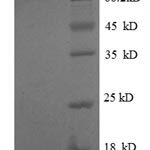Human GDF-8 / Myostatin / MSTN Bioactive Protein Product Attributes
Product Type: Bioactive Protein
Recombinant GDF-8 / Myostatin / MSTN based upon sequence from: Human
Host: QP5329 protein expressed in E. coli.
Tag: Untagged
Recommended Applications: Bioactive
Application Notes: Please contact us for application specific information for QP5329.
Bioactivity Data: MPC-11 cell cytotoxicity significantly induced by less than 50 ng/ml which corresponds to an activity of at least 2.0 x 10^4 units/mg.
Monomer or Dimer: Dimer
Amino Acid Sequence: DFGLDCDEHS TESRCCRYPL TVDFEAFGWD WIIAPKRYKA NYCSGECEFV FLQKYPHTHL VHQANPRGSA GPCCTPTKMS PINMLYFNGK EQIIYGKIPA MVVDRCGCS
Purity: Greater than 95% as determined by SDS-PAGE.
Reconstitution Instructions:
Concentration of Human GDF-8 / Myostatin / MSTN Protein: Lyophilized. Concentration determined by reconstitution volume.
Endotoxin Levels: Less than or equal to 1.00 EUs/ug as determined by the LAL method.
Buffer: Sterile filtered (0.22 um) solution containing 0.1% TFA
Storage Conditions: Store at -20C to -80C lyophilized. Guaranteed for 1 year at -80C reconstituted and 3 months at 4C reconstituted.
| Recombinant Human GDF-8 / Myostatin / MSTN Protein General Information | |
|---|---|
| Alternate Names | |
| GDF-8, Myostatin, MSTN, Cmpt, Gdf8 | |
| Curated Database and Bioinformatic Data | |
| Gene Symbol | MSTN |
| Entrez Gene ID | 2660 |
| Ensemble Gene ID | ENSG00000138379 |
| RefSeq Protein Accession(s) | NP_005250.1 |
| RefSeq mRNA Accession(s) | NM_005259.2 |
| UniProt ID(s) | O14793 |
| UniGene ID(s) | Hs.41565 |
| HGNC ID(s) | HGNC:4223 |
| COSMIC ID Link(s) | MSTN |
| KEGG Gene ID(s) | hsa:2660 |
| PharmGKB ID(s) | PA162396253 |
| General Description of Recombinant Human GDF-8 / Myostatin / MSTN Protein . | |
| Myostatin (GDF-8), a conserved member of the TGF-beta superfamily, is an essential regulator of skeletal muscle mass and cardiac muscle development and function. Myostatin is a secreted protein that negatively regulates skeletal muscle growth by determining muscle fiber number and size. Myostatin binds one of the two activin type II receptors (ACTRIIA, ACTRIIB) to activate SMAD signaling. Myostatin also activates MAPK signaling through TAK1-MKK6 and Ras pathways. Inhibition of myostatin increases muscle mass in a number of human disease animal models, such as muscular dystrophy. | |
Limitations and Performance Guarantee
This is a life science research product (for Research Use Only). This product is guaranteed to work for a period of two years when stored at -70C or colder, and one year when aliquoted and stored at -20C.







There are no reviews yet.